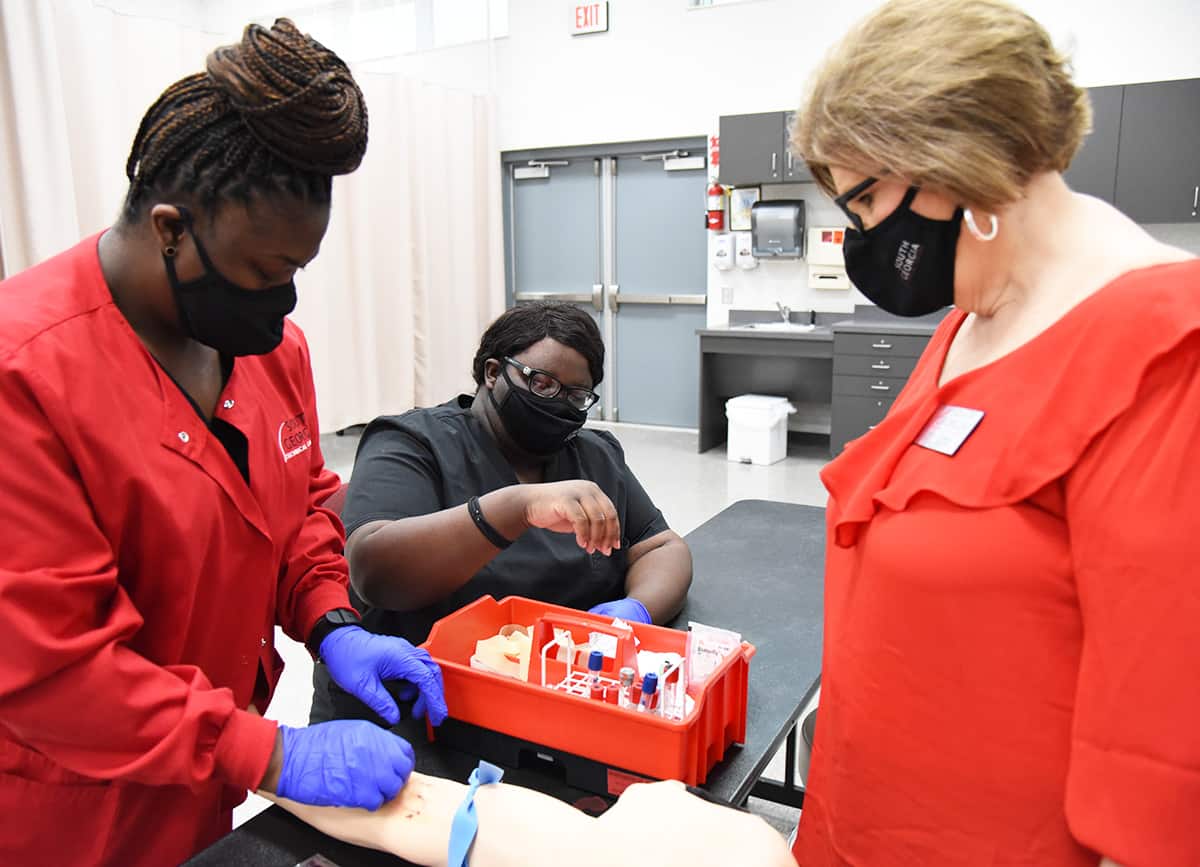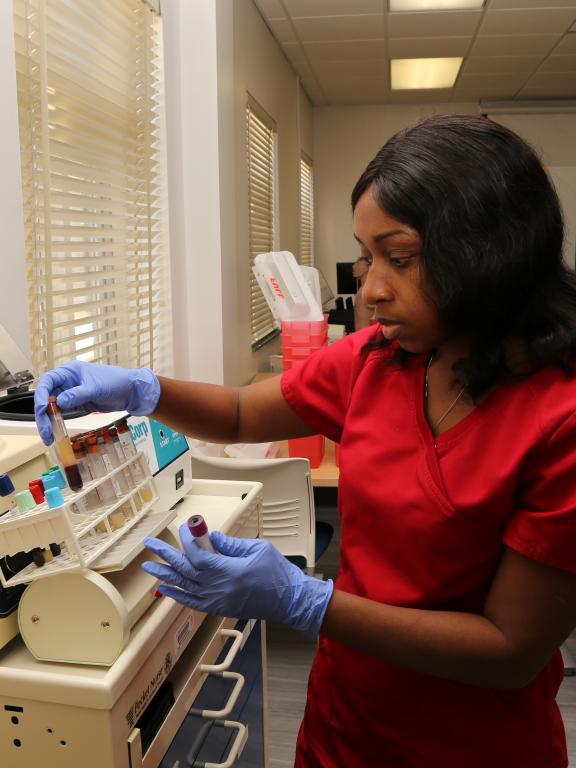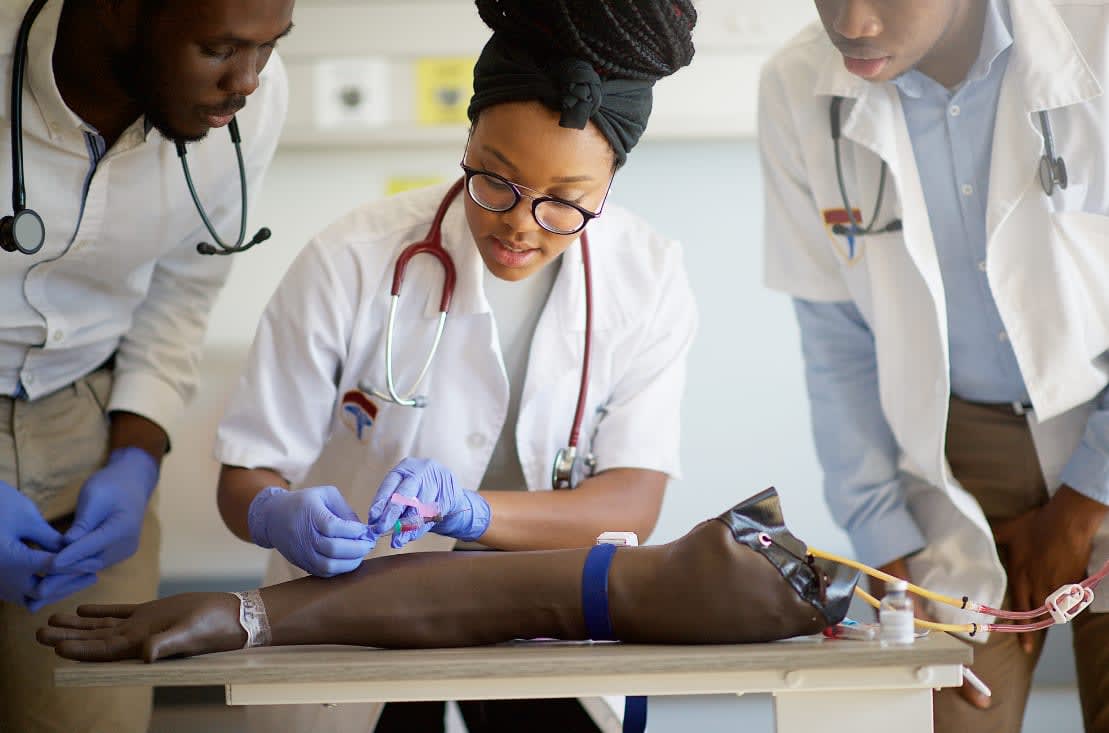Phlebotomy Classes Near Me: What Supplies You’ll Need
Phlebotomy Classes Near Me: What Supplies You’ll Need
Blog Article
The Path to Certification: Understanding the Phlebotomy Educating Course Trip and Its Value
As you consider the course to qualification in phlebotomy, it is very important to understand the function you'll play in healthcare. Your training will cover vital abilities, from blood collection techniques to patient communication. Each component of the program prepares you for the obstacles in advance. What specifically does the trip involve, and why is certification so critical for your future career? Let's check out these questions better.

The Role of Phlebotomists in Healthcare
Phlebotomists play a vital function in the healthcare system, functioning as the crucial web link in between clients and crucial analysis screening. You'll do blood attracts, making sure samples are gathered properly and securely. Your expertise assists in detecting medical problems, monitoring health and wellness, and assisting treatment choices.
In your everyday interactions, you'll need to establish count on with patients, making them feel comfortable during what could be a demanding experience. You are accountable for identifying and handling samples very carefully to stop contamination or mistakes, which could affect examination results.
Beyond this, you'll frequently function alongside medical professionals and nurses, interacting essential details regarding people' problems. By mastering your abilities, you add meaningfully to client treatment, making you a crucial part of the medical group.
Overview of Phlebotomy Training Programs
When checking out phlebotomy training programs, you'll find various kinds developed to fit different schedules and learning styles. Each program helps you establish vital skills like blood collection and person communication. Comprehending these options is essential to selecting the ideal path for your occupation.
Kinds Of Educating Programs
A number of sorts of training programs are offered for those looking to come to be proficient in phlebotomy. You can choose from certificate programs, which generally last a few months and concentrate on essential skills. There are also diploma programs that give an even more detailed education and learning, usually lasting up to a year. If you're seeking a deeper understanding, an associate level in an associated field may be the ideal fit. Online courses supply flexibility for those stabilizing work or family dedications, permitting you to research at your very own speed. Furthermore, some health centers and facilities provide on-the-job training programs, giving practical experience while you find out. Whatever path you select, each program intends to outfit you with the needed abilities for an effective phlebotomy occupation.

Key Skills Developed
Grasping phlebotomy requires a set of key skills that are created with comprehensive training programs. Additionally, interaction abilities are basic; you'll need to communicate with clients, explain procedures, and put them at ease. Each of these abilities is important for your success as a licensed phlebotomist, making you a beneficial asset in any type of medical care setup.
Key Parts of a Phlebotomy Program
In a phlebotomy course, you'll concentrate on necessary subjects that prepared for your future occupation. You'll take part in hands-on training that allows you to apply what you've learned in real-world setups. Both the core curriculum and sensible experience are vital for your success as a phlebotomist.
Core Curriculum Review
While seeking a phlebotomy training course, you'll come across a core curriculum developed to furnish you with basic abilities and understanding. Phlebotomy school. This educational program usually includes anatomy and physiology, concentrating on the circulatory system and understanding blood parts. You'll also discover around various sorts of blood collection methods, consisting of venipuncture and capillary slit techniques
In addition, infection control and safety methods are essential elements, ensuring you understand exactly how to keep a sterile environment. You'll study patient interaction, highlighting interaction and compassion, which are vital for alleviating individual anxiety.
Hands-On Training Experience
Obtaining hands-on experience is an indispensable component of your phlebotomy training program. This useful training allows you to apply what you've found out in a real-world setup, boosting your skills and confidence. Phlebotomy Classes Near Me.
Additionally, you'll get the chance to interact with clients, which is important for developing your interaction abilities. This combination of technological proficiency and interpersonal skills is critical for your success as a licensed phlebotomist. Ultimately, hands-on training is where concept meets practice, strengthening your knowledge and readiness for qualification.
Certification and Licensing Demands
Prior to you can begin your job in phlebotomy, it is important to understand the certification and licensing requirements that vary by state. A lot of states require phlebotomists to hold an accreditation from an acknowledged company, such as the National Phlebotomy Association or the American Culture for Medical Pathology. These qualifications usually entail passing a test that evaluates your understanding and skills in the field.
In addition to accreditation, some states have particular licensing needs. You may need to complete a particular variety of hours in professional method, submit proof of training, or go through a background check. It is necessary to investigate your state's laws to make certain you meet all required standards.
Staying notified about these requirements not only aids you safeguard a placement but likewise improves your credibility as an expert. By satisfying these needs, you'll be well on your method to a successful job in phlebotomy.
Hands-On Training and Practical Experience
Hands-on training and functional experience are crucial parts of your phlebotomy education and learning, as they enable you to use theoretical expertise in real-world scenarios. Throughout your training, you'll participate in monitored venipuncture, find out proper techniques, and end up being aware of different blood collection equipment. This direct participation is vital for constructing your self-confidence and refining your skills.
You'll work very closely with experienced experts who can lead you with the subtleties of client communication and sample handling. Each session not just strengthens your understanding but also prepares you for the fast-paced setting of healthcare setups.
Furthermore, numerous programs include medical rotations, allowing you to experience varied settings, from healthcare facilities to outpatient facilities. This direct exposure aids you adapt to different obstacles and person requirements, guaranteeing you're well-prepared for your future duty. Welcome these chances, as they're necessary to becoming a competent and compassionate phlebotomist.
Obstacles Encountered During Training
While obtaining hands-on experience is crucial, it is necessary to acknowledge the difficulties that can occur during your phlebotomy training. You may experience anxiousness when doing treatments on actual people, specifically if you're brand-new to the environment. The pressure to obtain whatever right can be overwhelming. In addition, understanding the abilities required for blood attracts takes practice; you may struggle with technique at first.
Time administration can also be a difficulty, as balancing concept, useful sessions, and personal commitments can really feel challenging. You might face varying discovering rates among your peers, leading to feelings of insecurity if you believe you're falling back. Lastly, adjusting to the different personalities of teachers can be tough, as each might have an one-of-a-kind teaching design.
Recognizing these challenges at an early stage can prepare you for success and assist you develop resilience throughout your training journey.
Occupation Opportunities After Certification

As you obtain experience, you might even think about focusing on locations like pediatric or geriatric phlebotomy, catering to details individual demands. Some phlebotomists pick to progress their careers by becoming laboratory specialists or pursuing additional education and learning in medical care areas.
Additionally, your accreditation can cause functions in training or managing brand-new phlebotomists, enabling you to share your expertise. With the medical care market consistently expanding, your abilities will certainly constantly be in need, leading the way for a steady and fulfilling occupation. Accept the opportunities waiting for you!
Frequently Asked Questions
What Is the Typical Period of a Phlebotomy Educating Training Course?
Phlebotomy training courses usually last around four to 8 weeks. You'll participate in hands-on method, classroom direction, and on the internet discovering. Finishing this training prepares you for certification and a satisfying job in healthcare.
Are Online Phlebotomy Courses Available?
Yes, online phlebotomy training courses are available. They provide versatility and ease, enabling you to research at your own rate. Just verify the program is recognized to meet certification needs and obtain Phlebotomy Courses Near Me valuable skills for your occupation.
Exactly How Much Does Phlebotomy Training Normally Expense?
Phlebotomy training normally costs in between $700 and $2,500, relying on the program and place. You ought to consider factors like training course size, included materials, and hands-on experience when choosing the appropriate training for you.
What Are Common Requirements for Phlebotomy Training?
Typical prerequisites for phlebotomy training usually include a senior high school diploma or GED, booster shots, and a background check. Some programs may likewise require fundamental medical care knowledge or qualifications, ensuring you're gotten ready for hands-on training.
Can I Function While Finishing My Phlebotomy Training?
Yes, you can work while completing your phlebotomy training. Several students balance work with their studies, however make sure to handle your time effectively to guarantee you fulfill both work and training commitments effectively.
Report this page